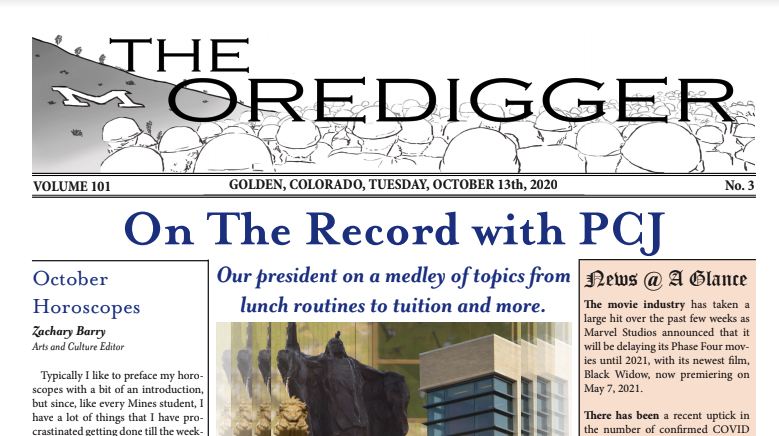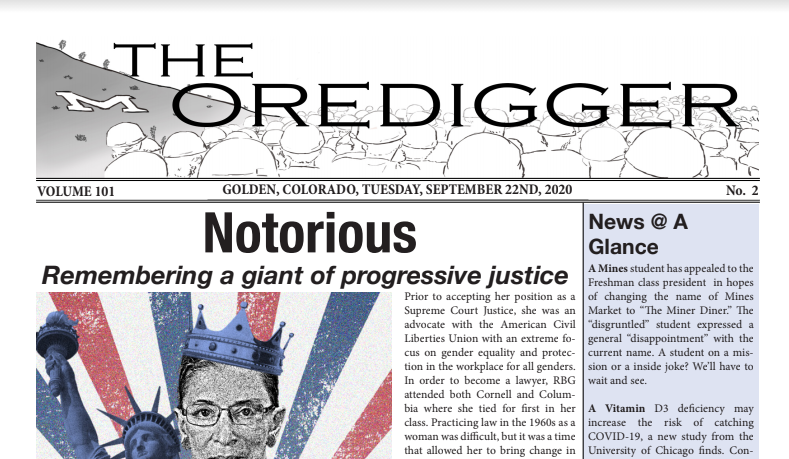“FrackNation,” a film made in response to the popular HBO documentary “Gasland,” was shown on campus by the Coloradans for Responsible Energy Development, or CRED, a community outreach organization put together by Noble Energy and Anadarko to educate the public about fracking and other industry processes. The film was introduced by Mike Dickinson, from Noble, and Mike Weaver, from Anadarko, both of whom are Mines alumni. Dickinson mentioned that in the last ten years alone the number of CSM students graduating from the petroleum engineering department has increased from thirty to over two hundred. Weaver asserted that the industry is “under a threat” and emphasized the number of jobs created in the state by the oil and gas industry. A panel of CSM professors was held after the showing for community members to ask questions of experts. Many present at the showing were not students, and the auditorium was all but filled to capacity.
“FrackNation” is an eminently frustrating film. On the one hand, it is undeniably propaganda. On the other hand, the film itself points out that propaganda is the only thing that gets heard in modern media. As a rebuttal to “Gasland,” it is extremely effective, managing to discredit Josh Fox (the maker of “Gasland”), a pair of his key interviewees, and much of his data. When the film diverges from its refutation of “Gasland,” however, it falls into absurdity.
In order to assess “FrackNation,” it is helpful to watch the movie it refutes. “Gasland,” an Oscar-nominated 2010 documentary about the Marcellus Shale, makes “FrackNation” look like the PBS News Hour: it is full of artsy out-of-focus establishing shots; intolerably obnoxious shaky-cam effects; pointless personal anecdotes; and Fox’s slurring, stilted, overly-theatrical narration. It is profoundly unscientific, more art film than documentary. (Josh Fox should really have stuck to banjo playing.)
Summarized, “Gasland” takes Fox from Pennsylvania to Colorado, Texas, and Wyoming in search of water contamination caused by gas drilling. He does not distinguish between well drilling, completion, or stimulation, instead lumping all three together as a nebulous sort of environmental disturbance. The movie relies mainly on interviews with people living near gas wells and storage tanks. No scientific facts are presented, except as a scare tactic; the word “chemicals” is treated as synonymous with “poisons”. It comprises a vague, simplistic moral statement along the lines of “gas production bad”. Yet it proved so popular that HBO financed a sequel – not to mention it sparked public opinion to turn against “fracking” in many parts of the country, without explaining in any detail what “fracking” actually is or any other facts that might be helpful to the viewers in determining their stance towards the process or the industry at large.
In watching “Gasland,” it becomes clear that Phelim McAleer, the director of “FrackNation,” was either unable to, unwilling to, or uninterested in providing a direct rebuttal to each and every one of the claims in “Gasland.” Nor did “FrackNation” have to address every point brought up. Several telling points were discussed. For one, the gas development lease in “Gasland” that Fox claims was sent to his Pennsylvania home is revealed to be a copy of a lease negotiated with Chesapeake Energy by a citizens’ cooperative in a neighboring rural township. This is not the first time McAleer catches Fox in a lie, but it is the most compelling. When McAleer requests an interview with Fox, Fox hangs up on him, refusing to answer any further calls. Fox even goes so far as to eject McAleer and his camera crew from a showing of “Gasland” rather than address McAleer’s questions, suggesting that Fox has no interest in debate, much less any discussion of the errors or misinformation in his film. Craig and Julie Sautner – citizens of the town of Dimock, PA, where much of “Gasland” takes place – were among some of the most vocal opponents of fracking, claiming that their water had turned black and undrinkable after fracking in the vicinity of their home. They, too, refuse to speak to McAleer once they realize he doubts their claims, behaving with hostility towards him. (They have since left Dimock for good.) There are a number of other interviewees in “Gasland,” however, who do not show up in “FrackNation;” in fact, the Sautners are the only complainants interviewed in both films. This could mean the rest of Fox’s contacts in Dimock did not wish to be in being involved in “FrackNation.” It could also mean that McAleer chose to show only the most unreasonable of the interviewees so as to demonize the opponents of fracking.
One of McAleer’s main points is that methane gas is naturally found in water in the Dimock area, that it was present long before people were and that it has done them no harm. He points out that methane-rich waters have been set alight in many places where no oil and gas development has occurred. While it is true that “Gasland” fails to mention even once that methane can occur naturally in groundwater, the famous scene of a man lighting his tap water on fire was actually filmed in Colorado, not Pennsylvania, as McAleer would have viewers believe. According to The Denver Post, it is inconclusive whether the methane in the water is linked to local drilling or not, but a few things are known which both filmmakers neglect to mention. First, drinking water with methane in it is not harmful to humans so long as the gas that bubbles out of the water does not collect in a poorly-ventilated area, where it could explode if ignited. Second, the energy company in Dimock which “Gasland” focuses on, Cabot Energy, was found to be responsible for some water contamination there, not because of fracking, but thanks to faulty well casings. “FrackNation” ignores Cabot altogether, instead focusing on Chesapeake, which is presumably more diligent about upholding their well completion quality standards. Indeed, the Colorado contamination, if connected to gas production in the area, is probably linked to faulty casings as well, as normal migration of gas through induced fractures into people’s water wells would take far longer than has been observed.
This leads to the real heart of the matter. Fracking, or hydraulic fracturing, has been in use since 1947. By setting “packers” in a well to allow pressure buildup, then pumping frac fluid into the well, the operator can initiate a “microquake”, with the pressure causing old natural fractures in the rock to reopen or new fractures to form. The induced fractures allow the well to drain from a larger area, since the fractures act as conduits for gas to flow through. The propagation distance of induced fractures from the well, however, is 300 feet on average and no more than 1500 feet, according to two 2011 studies. Since the Colorado aquifer is a mile and a half from the reservoir being produced, it is unlikely that induced fractures could have formed a pathway between the rock units. Yet neither Fox nor McAleer seems to think it is reasonable to blame contamination on the far more likely possibility of leaky well casings. On Fox’s part, it is likely because “bad well casings” is not scary-sounding, while “fracking” sounds ominous to the unlearned ear. On McAleer’s part, he probably avoided mentioning the lawsuit against Cabot because, even though fracking was not related to the incident, to suggest that the operator was responsible for the pollution in any way, even in an isolated circumstance, could be seen as anti-industry, or perhaps used as ammunition in the fight to ban gas production. So the facts get glossed over in both instances, and the “truth” McAleer continually refers to remains hidden, at least in part, from the public eye.
For anyone knowlegeable in oil and gas processes, natural or artificial, “Gasland” is obviously blatant misinformation. “FrackNation”‘s attack on “Gasland” is systematic and put forward in terms digestible to the average uneducated American. But “FrackNation” does not stop at exposing “Gasland”‘s inaccuracies. “FrackNation” attempts to change public opinion, as “Gasland” did. Josh Fox demonized the natural gas industry; Phelim McAleer paints it as a benevolent savior. He makes three points: 1. the leases paid to rural farmers in Pennsylvania by the gas companies allow the farmers to continue their way of life, as the extra money keeps them from the verge of bankruptcy; 2. American natural gas is an important alternative to Russian gas, especially for the European countries in thrall to Russia because they have no other source of gas; and 3. energy is important, so natural gas, as an energy source, is necessary for a comfortable, civilized standard of living.
The first point is true and valid. When a moratorium was placed on gas production in the Dimock area, drilling was halted and many citizens in the vicinity lost their monthly lease checks. Having a gas well on one’s property ensures a sizable amount paid to the owner by the well operator, which for a struggling farmer really can mean the difference between making it and going bust. The people of Dimock were upset at the stigma that “Gasland” pinned on their town, no doubt losing precious tourist dollars as well. The simple fact is, people have to get by, and having drilling on their property is an easy way to get them extra cash without giving them extra work. Perhaps a solution to this would be to pay an added premium for risk of air or water pollution, thus satisfying the landowner and allaying people’s fears, while still allowing production to proceed.
McAleer’s second point, however, is a stretch. American gas production will do little to help the little old Polish widow interviewed in the film, and should gas production here decrease, it will not lead to Russia controlling America any more than American dependence on Saudi oil has led to Saudi Arabia controlling the U.S. As for McAleer’s third point, it is here that “FrackNation” falls to the same level as “Gasland.” Besides being phrased in the most childish of ways, the argument contains two offensive and harmful sub-points. First, McAleer takes the opportunity to attack clean energy, saying that geothermal plants cause earthquakes, and that both windmills and solar panels will make the U.S. dependent on China and responsible for the deaths of workers in Chinese factories with low health and safety standards. Then he shows a map of the world at night and makes the claim that the poorly-lit areas (ie. Africa) are hotbeds of violence and starvation, where life is cheap and disease runs rampant. The implication that hydraulic fracturing will solve all the world’s problems is laughable. Notwithstanding that most power plants burn coal, electricity does not mean an end to war and hardship, nor does the lack thereof mean that people might as well be dead. To end on such a note is detrimental to “FrackNation”‘s credibility, not to mention it does little to combat the emotionality and propagandistic problems of the media that this very film itself laments.
One more thing worth noting is the fact that Phelim McAleer’s other film credits consist of a pro-mining documentary, “Mine Your Own Business”, and a movie claiming that anthropogenic climate change has no scientific basis called “Not Evil Just Wrong”.
This leaves the educated, politically-aware viewer discouraged. On one side of the debate is Josh Fox, an extremist out of touch with the economic concerns of real people and the safety standards of local industry, and on the other hand is a climate-change denying extremist who imitates the very thing he derides. Where is the voice of common sense? Yes, there is no reason to ban fracking any more than there is to ban any other production method. But at the same time, attacking clean energy as a way of defending fracking is absurd. In order to meet the energy needs of a modernizing world, humankind needs every source available. This includes fossil fuels, but it also includes wind farms, solar panels, geothermal plants, and nuclear energy. As a Pennsylvania politician tells Fox in “Gasland,” “There’s no such thing as a perfect source of energy.” Technological progress and increased efficiency in all areas is the only sustainable solution.
But then, that would hardly win a film producer an Oscar, now would it?




'Hydraulic Fracturing: Fact and Fiction' has no comments
Be the first to comment this post!